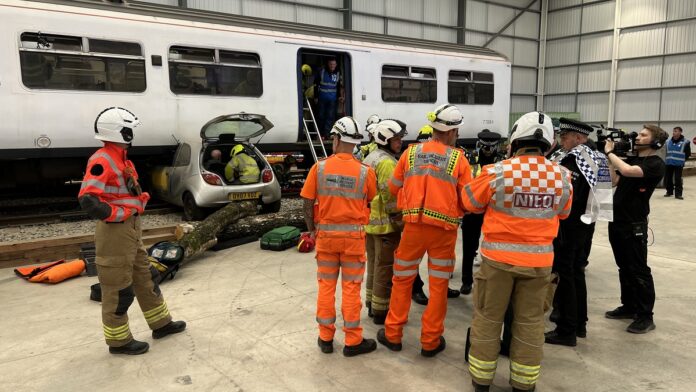A unique, true-to-life training facility, the Birmingham Rail Resilience Hub, has officially opened in Aston, positioning the West Midlands at the forefront of railway emergency planning. Created by Network Rail’s Central route, the hub is designed to prepare transport providers and all emergency services for major incidents on the railway network.
The purpose-built facility has been mocked up to include tracks, trains, level crossings, and other equipment and hazards found on a working railway. This realistic setting allows for close partnership working between organisations, providing a safe environment to learn and improve together.
The facility was formally opened by Denise Wetton, Network Rail’s Central route director, and Martin Colmey, Central route’s operations director. Following the opening, it hosted its first emergency exercise, simulating a vehicle being struck by a train at a level crossing with passengers on board. The exercise demonstrated how teams would assess and secure the area, rescue trapped and injured people, and initiate an investigation before reopening the line.
Preparedness for All Eventualities
Network Rail stressed the importance of readiness, not just for major incidents but for day-to-day disruption. The new hub is expected to be a focal point for supporting training and learning nationwide.
Denise Wetton, Network Rail’s Central route director, said: “Every day, we work round-the-clock to keep the railway running safely for passengers and freight across Britain. But we must be prepared for all eventualities and this facility puts the West Midlands at the forefront of training, readiness for day-to-day disruption and dealing with major incidents. This hub creates a safe, realistic environment which allows the railway, emergency services and industry partners to learn and work together so we are ready to deal with situations in real life. We hope the scenarios which will be tested here never happen, but training and learning in this way will help everyone be prepared and ready.”
Organisations involved in the inaugural exercise included West Midlands Police, British Transport Police, West Midlands Ambulance Service, West Midlands Fire Service, and Hereford & Worcester Fire and Rescue Service.
Fostering Collaboration and Trust
Emergency service leaders praised the new facility for the opportunities it provides for inter-agency collaboration.
Rebecca Hodgkins, Operations Station Commander, West Midlands Fire Service, said: “It’s been fantastic to collaborate with Network Rail and test our response to rail incidents alongside our other amazing blue light partners at this new training facility in Aston – a brilliant step forward in strengthening how we work together to ensure a safe, assertive and effective response to rail incidents.”
James Williams, WMAS Head of Emergency Preparedness, Resilience and Response, said: “This new training facility is a really useful resource that will allow our crews to realistically prepare for significant incidents on the region’s railways. It was great to be involved in the opening last week where we got to see first-hand the benefits the facility will bring to emergency response in the West Midlands.”
The Rail Accident Investigation Branch (RAIB), which was in attendance, also underscored the necessity of collaborative training.
Andy Lewis, Deputy Chief Inspector, RAIB, said: “A successful response to rail accidents relies on effective collaboration between the agencies involved — from the railway industry to emergency services and accident investigators. This facility offers an invaluable opportunity for teams to train together in realistic scenarios, building the trust and mutual understanding needed to ensure responders are equipped and ready to work together under the pressures of real-world incidents.”
In addition to its role as a learning facility, the hub’s strategic location also serves as the base for Network Rail Central route’s response teams, who are the first on site when incidents disrupt train services. It will also be used as a secure storage area for essential and specialist equipment needed for repairs.





